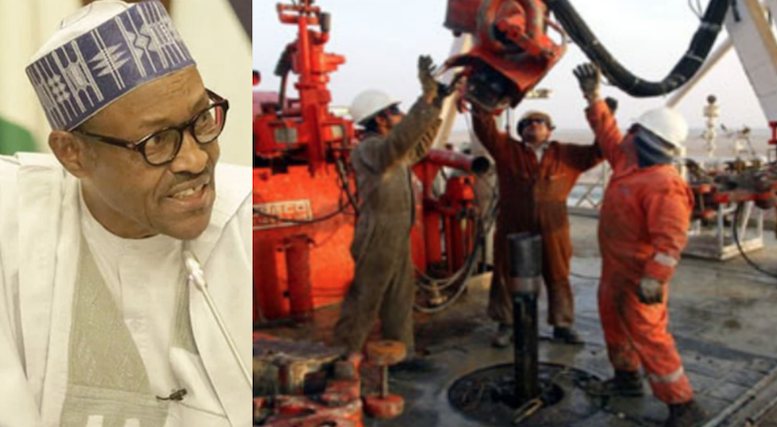There are indications that the Federal Government may be pressured to completely deregulate the downstream sector of Nigeria’s petroleum industry, as President Muhammadu Buhari meets major stakeholders in Aso Rock, tomorrow. Vanguard gathered that many of the stakeholders invited to engage with the president, as part of measures at finding lasting solution to the lingering fuel scarcity, tomorrow, are in favour of total deregulation.
More..
- “Your wife wey boys don f**k finish for Ikeja, cheap runs girl” – Fan blast Oritsefemi, then he replies…
- 12 of the oldest spinsters in Nollywood reveal why they haven’t married, GENEVIEVE’s reason is quite funny
- Wizkid visits Davido at home, planning a music collaboration which will shake Africa
- This is why nobody wants to buy Michael Jackson’s Neverland popular mansion – This will definitely leave you shocked (With Pics)
For instance, Mr. Mike Osatuyi, National Operation Controller, Independent Marketers Association of Nigeria, IPMAN, told Vanguard yesterday that total deregulation remained the best solution to ending the fuel scarcity.
“The deregulation of the downstream sector remains the only potent and lasting solution for ending the scarcity. But cost implication of the policy will make the price of petrol too expensive for Nigerians.
“The explanation is that the deregulation of the downstream will shift the burden from the government to users of the product.
Consequently, the present government may be reluctant in introducing the policy because of imposing more suffering on the already impoverished masses.”
The meeting will likely examine other options, including continued massive importation by the Nigerian National Petroleum Corporation, NNPC and the involvement of oil marketers in direct importation of the product.
The major and independent oil marketers, it was gathered would need discounted allocation of N250 to a dollar and approval by the government to import the product.
The marketers believe that the second option will be better as they already have commercial storage facilities to store and distribute the product to filling stations nationwide.
Vanguard, meanwhile, gathered that the engagement will be attended by Dr. Ibe Kachikwu, Minister of State for Petroleum Resources; Mr. Maikanti Baru, Group Managing Director, NNPC; Mr. Mordecai Ladan, Director, Department of Petroleum Resources; Mr. Femi Olawore, Executive Secretary, Major Marketers Association of Nigeria, MOMAN; Mr. Mike Osatuyi, National Operation Controller, IPMAN; and Mr Olufemi Adewole, Executive Secretary, Depot and Petroleum Products Marketers Association, DAPPMA.
Supply in Abuja
There was, however, a significant improvement in fuel supply in Abuja and Lagos, yesterday as the long queues that had been witnessed in petrol stations across in the last couple of weeks disappeared.
This was even as a coalition of civil society groups under the aegis of Civil Society for Development Initiative, CSDI, accused oil marketers of sabotage triggering the fuel crisis which has brought untold hardship on Nigerians over the last couple of weeks.
At many of the petrol stations visited by Vanguard, the situation was calm, as most of the attendants were idle, as only one or two vehicles were seen purchasing the products in most cases.
At Dutse, along the Abuja-Kaduna Expressway, Abuja, with the exception of Oando, Gegu and MRS petrol stations were selling the products, with only few vehicles at their premises.
Warri
Meantime, black marketers were seen selling a litre of petrol at N300 per litre on several roads in the city. Few filling stations with petrol sold at between N220 and 250 per litre,” some motorists said.
Lagos
In Lagos, many filling stations that did not have supply of the product shut their gates to motorists.
While a few that had fuel sold at the regulated price of N145 per litre, others sold it at arbitrary prices of between N145 and N300, depending on their locations.
NLC canvass local refining
However, decrying the ongoing fuel shortage, NLC, through its President, Ayuba Wabba said: “In the last three weeks, Nigerians have witnessed one of the worst shortages in the supply of petrol in the history of the country.
This is in spite of Federal Government’s repeated claim that with the complete removal of subsidy on petroleum products, scarcity of petroleum products would become a thing of the past. We have therefore in the last few weeks watched with dismay the unfortunate blame game, accusations and counter accusations between petroleum marketers: Major Oil Marketers Association of Nigeria, MOMAN, IPMAN, DAPPMA and NNPC, on who is responsible for the current scarcity.
“For us in the Congress, our position with regard to the prevailing situation in the petroleum industry remains constant, which is that the crisis in the industry is squarely due to the inability or refusal of our ruling elite to refine all our petroleum needs in Nigeria. We are the only major producer of crude oil in the world that depends on importation of refined products from abroad. As long as this remains the case, Nigerians would continue to be subjected to this intermittent scarcity.”
We had explicitly stated this fact in our 188-page “Report of the NLC Committee on Deregulation”, submitted to the Yar’Adua government in 2010 and which we gave to top officials of this administration when they assumed office in 2015.
We wish to note that this report was a product of consultations with key stakeholders in Nigeria – from the Governors Forum (then under the chairmanship of Dr. Bukola Saraki as Governor of Kwara State, now the current Senate President), NNPC, Ministry of Finance, Major Markers Association of Nigeria, MOMAN and CSOs, among others. “It was on the basis of the above conviction that the Congress went on national protest in May 2016, following the 66 percent increase from N86.50 per litre to N145 per litre, in the price of petrol by the current government in the name of total removal of subsidy.
For us in the Congress, and for majority of working people in Nigeria, the hope placed on the capacity of President Buhari to bring about positive change is being undermined by his government’s inability to address the infrastructural deficit and other related problems in the oil industry, such as making our existing refineries work at optimal capacity by refining products for domestic consumption.
“ Not only is government unable to achieve this for almost three years now, but moving forward more refineries, especially modular refineries which can be built between 12 and 18 months are required to address the reoccurring challenge of fuel scarcity and price hike in Nigeria and stop the exploitation of ordinary Nigerians.
The inherent corruption in the system has made this impossible for more than three decades and should be addressed headlong.”
-nairaland
CLICK HERE to follow our Channel for juicy updates & free giveaways.
TRENDING NOW
- List of top 10 richest Yoruba actors and actresses and their net worth 2017 – Funke Akindele & Odunlade Adekola are dragging for supremacy on this
- 12 celebrities you forgot had passed away – #3 died at his peak (With Photos)
- “Your wife wey boys don f**k finish for Ikeja, cheap runs girl” – Fan blast Oritsefemi, then he replies…
- LADIES: Before you get married to your boyfriend, make sure you do these 10 things in front of him!
- Genevieve Nnaji secretly married and given birth to second child (Photos)
- The posh lives of the Otedola daughters; Living large, wardrobe, jet, cars + Mr. Eazi is enjoying money.. (With Photos)
- 5 throwback pictures of Bobrisky That proves no one is ugly, they are just broke– this will shock you! (See Photos)




































Discussion about this post